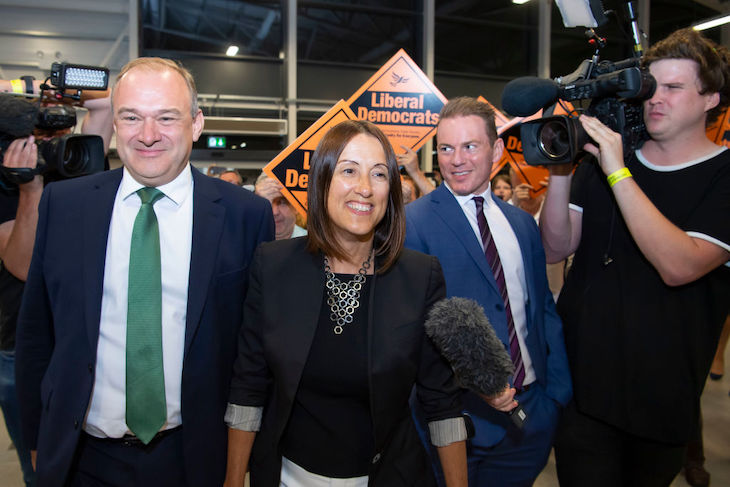Were there a Most Beautiful Parliamentary Constituency in the UK award, Brecon and Radnorshire would be a very plausible contender. But Conservatives may be struggling to appreciate the aesthetic appeal of this large chunk of rural mid-Wales today. The by-election there overnight has reduced Prime Minister Johnson’s effective parliamentary majority – that is, including the DUP – to a single seat. A difficult parliamentary situation for the government just got ever-so-slightly worse. So much for the honeymoon period…
In truth, the by-election result should not have been much of a shock. Brecon and Radnor has not, historically, been particularly fertile territory for the Conservative party. The seat was actually held – albeit on slightly more favourable boundaries – by the Labour party between a 1939 by-election and 1979. It was then captured by the SDP-Liberal Alliance in a famous 1985 by-election, lost in 1992, but then re-taken by the Lib-Dems in 1997 and held until the Clegg-catastrophe of 2015. The Conservatives have only held the parliamentary seat there for fifteen of the last eighty years. (The Tories have also, by the way, never won the National Assembly Brecon and Radnor seat either).
The circumstances of the by-election were also distinctly unhelpful for the Conservatives. Chris Davies, who captured the seat in 2015 and increased his majority two years later, was disqualified via a public petition after being convicted earlier this year of filling a false expenses claim. To the surprise of many observers, Davies was re-adopted as the Conservatives’ candidate for the ensuing by-election. A popular constituency MP, Davies probably stood as good a chance of holding the seat for his party as anyone. Behind the scenes, some Welsh Tories also suggested that he was, in effect, being asked to make up for his misdemeanour by ‘taking one for the team’: any loss could be blamed on him personally rather than the party as a whole.
The wider political context was hardly more helpful for the Conservatives than the local one. The latest Welsh opinion poll, published on the Monday prior to the by-election, suggested a swing in voter preferences since the 2017 general election that, in itself, would have been enough for the Liberal Democrats to re-take the seat. And with the Liberal Democrats’ revived by-election machine throwing plenty of resources at the fight, the final outcome should have been in little doubt.
In the event, the by-election result was perhaps a little closer than some had expected:
Jane Dodds (Liberal Democrat), 13,826
Chris Davies (Conservative), 12,401
Des Parkinson (Brexit Party) 3,331
Tom Davies (Labour), 1,680
Lady Lily the Pink (Monster Raving Loony Party) 334
Liz Phillips (UKIP) 242
Turnout: 59.7 per cent
In every sense, the Liberal Democrats are the obvious winners from Brecon and Radnor. Since losing their last Welsh MP in 2017, and with their only member of the Welsh Assembly serving as Education Minister in the Labour government, the party have really struggled for profile in Wales. The Welsh Liberal Democrats are now back in the game, and their victorious candidate, who has also been their Welsh leader since autumn 2017, will now have a much better platform from which to promote her party’s message. For Jo Swinson the result also represents a flying start to her leadership, and may well help deliver even further improvements in the Lib-Dems’ fortunes in the opinion polls.
For Labour, this was a truly dreadful result – and one which can hardly be blamed on their unfortunate candidate. While they were never likely to win here, barely saving their deposit was a humiliating outcome. Coming in the wake of Monday’s poll, which showed Labour support for both Westminster and the National Assembly at its lowest-ever recorded level in Wales, Brecon and Radnor will heighten concerns within the party that its current UK and Welsh leadership are leading Labour towards potential electoral disaster.
For the Brexit Party, the result is very much in line with polling that suggests that its European elections surge has already lost some momentum. The party is not likely to disappear as quickly as it emerged, but it will likely continue to struggle to achieve the effective organisation on the ground that would be needed for it to come close to winning parliamentary seats either in by-elections or a general election.
As for the Conservatives – well, Chris Davies and his local party can lick their wounds knowing that they achieved a very respectable outcome, and that the seat will be very much ‘in play’ whenever the next general election comes. The Tories should be particularly pleased at the way that their vote held up against the Brexit Party challenge. But after experiencing only a rather modest ‘Boris bounce’ in polls, the party continues to face all the problems of dealing with Brexit, and a parliamentary situation that, if anything, just became even harder.






Comments